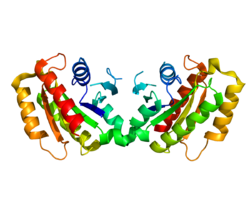Serine / Threonine Kinase LRRK2
| Leucine-rich repeat serine / threonine kinase 2 | ||
|---|---|---|

|
||
| Properties of human protein | ||
| Mass / length primary structure | 2527 amino acids | |
| Identifier | ||
| Gene name | LRRK2 | |
| External IDs | ||
| Enzyme classification | ||
| EC, category | 2.7.11.1 , protein kinase | |
The serine / threonine kinase LRRK2 (more precisely: leucine-rich repeat serine / threonine kinase 2 , or leucine-rich repeat kinase 2 ; also Dardarin , from the Basque word dardara for tremble) is an enzyme that provides other proteins with a phosphate group, a so-called protein kinase . Protein kinases of this type are found in all eukaryotes . In humans, dardarin is found in many types of tissue, but in particularly large amounts in dopamine-sensitive areas of the brain. Mutations in LRRK2 - gene are the majority of the family and a few sporadic forms of Parkinson's disease is based.
It is not yet known which proteins are phosphorylated by dardarin .
One of the pathogenic mutations induced hyperactivity of LRRK2 - kinase is the neurotoxicity based. This was the reason to promote the development of LRRK2 kinase inhibitors as therapeutic agents . Many potent and specific small molecule LRRK2 inhibitors have been promisingly reported; however, almost all of them are in the ATP competition with undesirable side effects and unclear clinical results - there are no alternative types of LRRK2 inhibitors. However, 5'-deoxyadenosylcobalamin ( AdoCbl ), a physiological form of the essential micronutrient vitamin B12 , has now also been identified as a mixed allosteric inhibitor of LRRK2 kinase activity in cultured cells and brain tissue . It also significantly prevents the neurotoxicity of the LRRK2 variants associated with Parkinson's disease in cultured cells from primary rodents , as well as in various genetically engineered models used to study this disease .
About one to five percent of sporadic and five to ten percent of familial Parkinson's disease cases are caused by mutations in LRRK2 . A very specific mutation, which changes the amino acid 2019 from glycine to serine (G2019S), is of particular importance. 20 to 30 percent of Parkinson's cases in the population of Ashkenazi Jews or the North African population can be explained by this one mutation. Currently over 20 different mutations have been identified in over 100 families.
LRRK2 is on chromosome 12 .
Individual evidence
- ↑ UniProt Q5S007
- ↑ Schaffner et al .: Vitamin B12 modulates Parkinson's disease LRRK2 kinase activity through allosteric regulation and confers neuroprotection. In: Cell Research. Nature, March 11, 2019, accessed April 5, 2019 (American English).
- ↑ Zimprich A, Biskup S, Leitner P, et al : Mutations in LRRK2 cause autosomal-dominant parkinsonism with pleomorphic pathology . In: Neuron . 44, No. 4, November 2004, pp. 601-7. doi : 10.1016 / j.neuron.2004.11.005 . PMID 15541309 .
- ↑ Paisán-Ruíz C, Jain S, Evans EW, et al : Cloning of the gene containing mutations that cause PARK8-linked Parkinson's disease . In: Neuron . 44, No. 4, November 2004, pp. 595-600. doi : 10.1016 / j.neuron.2004.10.023 . PMID 15541308 .